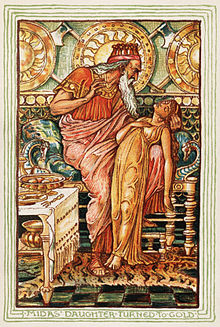
Midas (/ˈmaɪdəs/; Greek: Μίδας) was a king of Phrygia with whom many myths became associated, as well as two later members of the Phrygian royal house.
His father was Gordias, and his mother was Cybele. The most famous King Midas is popularly remembered in Greek mythology for his ability to turn everything he touched into pure gold and this came to be called the golden touch, or the Midas touch.[1] The legends told about this Midas and his adopted father Gordias, credited with founding the Phrygian capital city Gordium and tying the Gordian Knot, indicate that they were believed to have lived sometime in the 2nd millennium BC, well before the Trojan War. However, Homer does not mention Midas or Gordias, while instead mentioning two other Phrygian kings, Mygdon and Otreus.
Midaeum was presumably named after him,[2] and this is probably also the Midas that according to Pausanias founded Ancyra (today known as Ankara).[3]
Another King Midas ruled Phrygia in the late 8th century BC. Most historians believe this Midas is the same person as the Mita, called king of the Mushki in Assyrian texts, who warred with Assyria and its Anatolian provinces during the same period.[4] A third Midas is said by Herodotus to have been a member of the royal house of Phrygia in the 6th century BC.
- ^ In alchemy, the transmutation of an object into gold is known as chrysopoeia.
- ^ "Phrygia, Midaeum - Ancient Greek Coins - WildWinds.com". www.wildwinds.com. Retrieved 2024-04-07.
- ^ Pausanias 1.4.5.
- ^ See for example Encyclopædia Britannica; also: "Virtually the only figure in Phrygian history who can be recognized as a distinct individual", begins Lynn E. Roller, "The Legend of Midas", Classical Antiquity, 22 (October 1983):299–313.